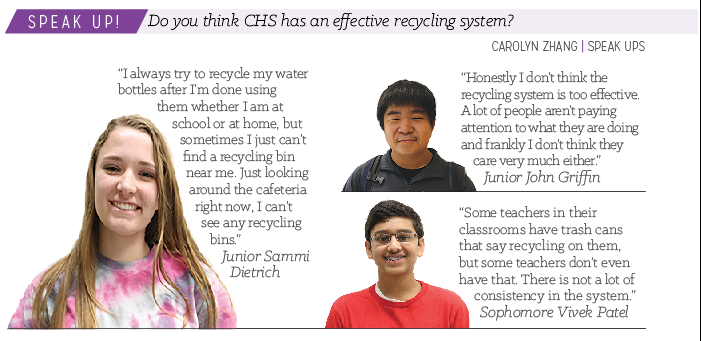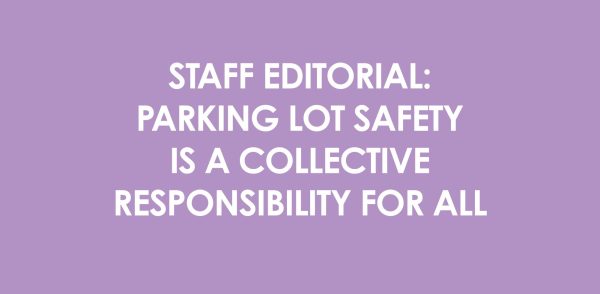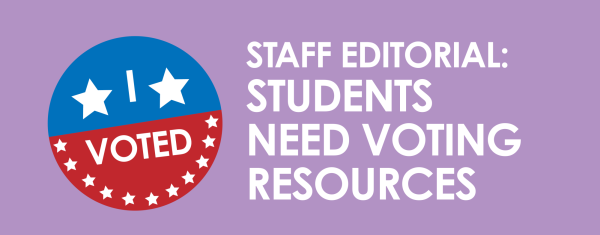Reduce, Reuse, Recycle: CHS administrators should increase Earth-friendly habits around the school.
More in Staff Editorials

This Saturday will mark the 40th celebration of Earth Day, a worldwide holiday dedicated to environmental protection, and one of the key activities any citizen can do to protect the environment is to put emphasis on recycling. According to the U.S. Environmental Protection Agency, recycling can reduce the amount of waste sent to landfills and combustion facilities; allow us to conserve natural resources such as timber, water and minerals; it prevents pollution by reducing the need to collect new raw materials; and it aids in saving energy. Recycling also reduces greenhouse gas emissions that contribute to global climate change, helps sustain the environment for future generations and can even help create new well-paying jobs in the recycling and manufacturing industries in the United States. With this in mind, this school should put policies into place that make recycling more of a priority.
While we have made strides with regards to recycling, including the recent addition of more recycling containers, there is still a problem here with our environmental sustainability. Our reputation with recycling is notably shaky. The contents of recycling bins are often dumped back into trash cans. Many students do not know the difference between recycling bins and trash bins in their classrooms, simply because they are not clearly marked or because they see fellow students emptying their trash into these bins. The system is not effective and not sustainable, and it can have dire impacts on our environment and our future as citizens of the world.
Recycling is absolutely necessary to protect the future of our country and our world. Harmful chemicals and greenhouse gases are released from rubbish in landfill sites. Habitat destruction and global warming are some of the effects caused by deforestation, but recycling reduces the need for raw materials so the rainforests can be preserved. Huge amounts of energy are used when making products from raw materials. Recycling requires much less energy, and therefore helps to preserve natural resources. Recycling is essential to cities around the world and to the people living in them. There is simply no more room for trash in our cities.
If this school places greater emphasis on recycling, students will follow suit, and this will allow for the creation of a more environmentally-stable school environment. The school should focus on providing opportunities to recycle, rather than throwing things in the garbage, in areas where students create more waste, such as the cafeteria. The cafeterias are usually marked by large cans filled with both food waste and paper-based waste. If the school places recycling bins in these areas, all the waste created in the cafeteria can be managed in a more environmentally friendly way.
In addition, the school should focus on educating students in environmentally sustainable recycling practices. If students are unsure which materials can be recycled, the natural decision is to simply throw everything away, rather than risk recycling something that can’t be recycled. If the school would take measures to educate students, perhaps by making an announcement or labeling recycling bins, students would be able to make informed decisions on where their waste goes.

Your donation will support the student journalists of Carmel High School - IN. Your contribution will allow us to purchase equipment and cover our annual website hosting costs.



















![Joseph Broman, Mu Alpha Theta sponsor, grades tests for his honors precalculus/trigonometry class. Broman said, “I’m retiring from the Math Club next year and I’m just going to do Mu Alpha Theta so I can focus on that one and we can do more [speaker series] first semester.”](https://hilite.org/wp-content/uploads/2024/03/IMG_9502-1200x900.jpg)











![British royalty are American celebrities [opinion]](https://hilite.org/wp-content/uploads/2024/03/Screenshot-2024-03-24-1.44.57-PM.png)




















![Review: “The Iron Claw” cannot get enough praise [MUSE]](https://hilite.org/wp-content/uploads/2024/04/unnamed.png)
![Review: “The Bear” sets an unbelievably high bar for future comedy shows [MUSE]](https://hilite.org/wp-content/uploads/2024/03/unnamed.png)
![Review: “Mysterious Lotus Casebook” is an amazing historical Chinese drama [MUSE]](https://hilite.org/wp-content/uploads/2024/03/0.webp)
![Thea Bendaly on her Instagram-run crochet shop [Biz Buzz]](https://hilite.org/wp-content/uploads/2024/03/IMG_0165-1200x838.jpg)
![Review: Sally Rooney’s “Normal People,” is the best book to read when you are in a time of change [MUSE]](https://hilite.org/wp-content/uploads/2024/03/20047217-low_res-normal-people.webp)
![Review in Print: Maripaz Villar brings a delightfully unique style to the world of WEBTOON [MUSE]](https://hilite.org/wp-content/uploads/2023/12/maripazcover-1200x960.jpg)
![Review: “The Sword of Kaigen” is a masterpiece [MUSE]](https://hilite.org/wp-content/uploads/2023/11/Screenshot-2023-11-26-201051.png)
![Review: Gateron Oil Kings, great linear switches, okay price [MUSE]](https://hilite.org/wp-content/uploads/2023/11/Screenshot-2023-11-26-200553.png)
![Review: “A Haunting in Venice” is a significant improvement from other Agatha Christie adaptations [MUSE]](https://hilite.org/wp-content/uploads/2023/11/e7ee2938a6d422669771bce6d8088521.jpg)
![Review: A Thanksgiving story from elementary school, still just as interesting [MUSE]](https://hilite.org/wp-content/uploads/2023/11/Screenshot-2023-11-26-195514-987x1200.png)
![Review: When I Fly Towards You, cute, uplifting youth drama [MUSE]](https://hilite.org/wp-content/uploads/2023/09/When-I-Fly-Towards-You-Chinese-drama.png)
![Postcards from Muse: Hawaii Travel Diary [MUSE]](https://hilite.org/wp-content/uploads/2023/09/My-project-1-1200x1200.jpg)
![Review: Ladybug & Cat Noir: The Movie, departure from original show [MUSE]](https://hilite.org/wp-content/uploads/2023/09/Ladybug__Cat_Noir_-_The_Movie_poster.jpg)
![Review in Print: Hidden Love is the cute, uplifting drama everyone needs [MUSE]](https://hilite.org/wp-content/uploads/2023/09/hiddenlovecover-e1693597208225-1030x1200.png)
![Review in Print: Heartstopper is the heartwarming queer romance we all need [MUSE]](https://hilite.org/wp-content/uploads/2023/08/museheartstoppercover-1200x654.png)







































